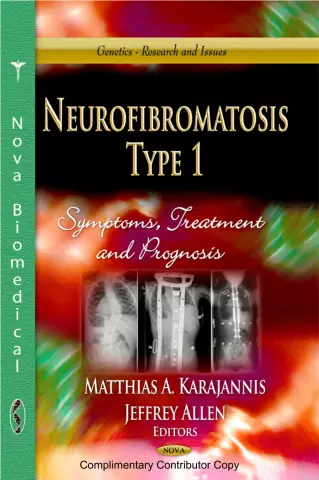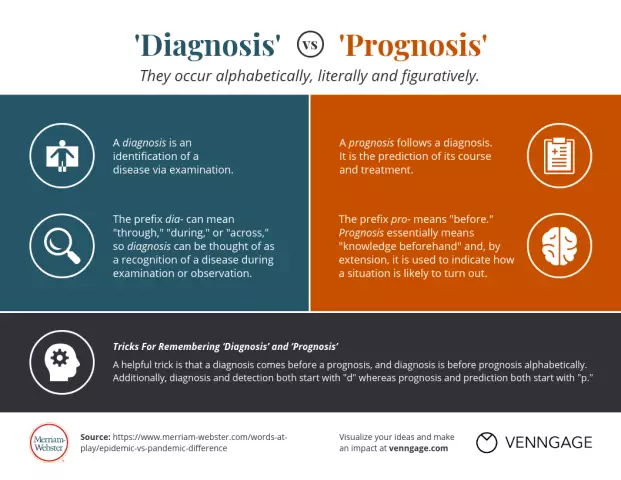- Author Rachel Wainwright wainwright@abchealthonline.com.
- Public 2023-12-15 07:39.
- Last modified 2025-11-02 20:14.
Thyroiditis
General characteristics of the disease
Thyroiditis is a whole group of diseases of various etiologies with one common symptom - the inflammatory process of the thyroid tissue. It is customary to distinguish 4 main forms of thyroiditis:
- autoimmune thyroiditis or chronic Hashimoto's thyroiditis;
- acute thyroiditis, which in turn can be purulent or non-purulent;
- subacute thyroiditis or de Quervain's thyroiditis
- and asymptomatic thyroiditis.
Each form of the disease needs specific treatment.
Chronic autoimmune thyroiditis

Autoimmune thyroiditis occurs as a result of the destruction of the follicular cells of the thyroid gland. This process develops due to a genetic defect in the body's immune response to its own thyrocytes. In patients with chronic autoimmune thyroiditis, antibodies to thyroid cells circulate in the blood.
The disease is often combined with other autoimmune diseases: primary hypocorticism, hepatitis, diabetes mellitus, rheumatoid arthritis and has a high risk (up to 70%) of being complicated by the development of hypothyroidism (thyroid hormone deficiency).
The euthyroid asymptomatic phase of chronic thyroiditis can last for decades. In this regard, it is difficult to establish the exact percentage of the disease. In relatives of patients with diagnosed autoimmune thyroiditis, antibodies to thyroid cells are diagnosed in 50% of cases.
Among the symptoms of autoimmune thyroiditis in the subclinical and clinical stages are called:
- an increased volume of the thyroid gland,
- discomfort in the thyroid gland,
- difficulty swallowing
- tenderness on palpation,
- weakness,
- joint pain.
In chronic thyroiditis, complicated by hypothyroidism, the patient manifests itself:
- trembling fingers
- tachycardia,
- sweating
- hypertension.
A special form of autoimmune thyroiditis is postpartum thyroiditis. It occurs in 5-9% of all pregnancies. Symptoms of this form of thyroiditis usually resolve without treatment within a year after birth.
Subacute thyroiditis
Subacute thyroiditis is an inflammation of the thyroid gland, presumably of viral origin. Thyroiditis of this form usually develops 2 weeks after the previous infection: flu, mumps, measles, etc.
Inflammation of the thyroid tissue is manifested by the following symptoms of thyroiditis:
- headache,
- decreased performance,
- feeling overwhelmed
- aching joints and muscles,
- chills,
- increased body temperature.
Among the local symptoms of subacute thyroiditis are edema and soreness of the thyroid gland. Pain may also be felt in the chin, ear, or back of the head. Most often, the disease is diagnosed in women 20-50 years old. In men, subacute thyroiditis is diagnosed 5 times less often than in women.
Asymptomatic thyroiditis

With this type of disease, there are no specific symptoms of thyroiditis. The only sign of pathology is a slight increase in the size of the thyroid gland. After a few weeks, the inflammation goes away on its own, and the size of the organ returns to normal. During a transient increase in the thyroid gland in the patient's body, the level of thyroid hormones rises.
Asymptomatic thyroiditis has a high likelihood of recurrence. The nature of its origin has not been studied by medicine.
Acute thyroiditis
Acute thyroiditis is the rarest form of the disease. The appearance of a purulent or non-purulent inflammatory process of the thyroid tissue provokes an infection caused by tonsillitis, pneumonia or sepsis. Nonsuppurative acute thyroiditis can also result from injury to the thyroid gland or radiation exposure.
Symptoms of acute thyroiditis include:
- thickening of the thyroid gland,
- the appearance of an abscess,
- a sharp increase in temperature up to 40 degrees,
- tachycardia,
- pain in the lower part of the head
- signs of body intoxication.
If the treatment of acute thyroiditis is not started in time, the disease can lead to irreversible thyroid insufficiency.
Diagnosis of thyroiditis
The diagnosis of "chronic autoimmune thyroiditis" is confirmed if a large amount of antibodies to thyroid cells is detected in a patient. A biopsy of the thyroid gland is required to establish a definitive diagnosis of chronic thyroiditis.
Subacute thyroiditis is diagnosed based on the patient's complaints of pain in the thyroid gland and pain in swallowing. In the patient's history, a case of recent infection should be recorded. You can confirm the diagnosis of "subacute thyroiditis" using ultrasound and the Kraille test. The latter is the introduction of Prednisolone and control over the patient's condition. With subacute thyroiditis, the daily dose of Prednisolone (30mg) greatly facilitates the patient's well-being.
With asymptomatic thyroiditis, a large amount of thyroid hormones and a low level of absorption of radioactive iodine by the thyroid gland are diagnosed in the patient's blood.
In the diagnosis of acute thyroiditis, the study of blood composition is also used. With this form of the disease, a high level of leukocytes and an increase in ESR are found. The amount of thyroid hormones is usually unchanged. The site of softening of the thyroid gland with a formed focus of abscess is visually determined.
Thyroiditis treatment
An effective treatment for thyroiditis of the autoimmune form, which guarantees the healing of the patient, has not yet been developed. The standard treatment for chronic thyroiditis is lifelong substitution therapy with thyroid drugs, such as L-Thyroxine.

Thanks to the intake of artificial thyroid hormones, it is possible to reduce the size of the goiter and prevent further hypertrophy of the organ tissues. Postpartum autoimmune thyroiditis usually does not need treatment. The exception is cases of chronic thyroiditis of this type lasting a year or more.
In the treatment of subacute thyroiditis, glucocorticoids, for example, Prednisolone, are widely used. It helps relieve the swelling of the thyroid gland. The duration of therapy is purely individual.
In the treatment of acute purulent thyroiditis, antibiotics and antihistamines are used. At the same time, in a hospital, intravenous drip administration of saline solutions is carried out, an abundant drink is prescribed to reduce the general intoxication of the body.
In the presence of an abscess, treatment of thyroiditis is surgical. It consists in opening and draining a purulent focus. If the abscess is not removed in time, it may spontaneously open and pus into the mediastinum or trachea of the patient. With adequate treatment of acute thyroiditis, recovery occurs within 1-2 months.
YouTube video related to the article:
The information is generalized and provided for informational purposes only. At the first sign of illness, see your doctor. Self-medication is hazardous to health!






